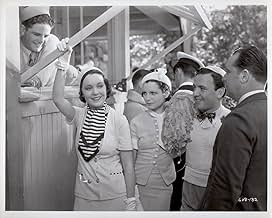Ajouter une intrigue dans votre langueAfter Nina Leeds finds out that insanity runs in her husband's family, she has a love child with a handsome doctor and lets her husband believes the child is his.After Nina Leeds finds out that insanity runs in her husband's family, she has a love child with a handsome doctor and lets her husband believes the child is his.After Nina Leeds finds out that insanity runs in her husband's family, she has a love child with a handsome doctor and lets her husband believes the child is his.
- Prix
- 3 victoires et 1 nomination au total
Avis en vedette
For the screen the voice over regarding the thoughts is used for all the characters. It probably is a technique better suited to the screen. Sir Laurence Olivier did very well with it in his version of Hamlet. But Bill Shakespeare gave Olivier a lot better story than O'Neill gave his players in this instance.
Players like Clark Gable, Norma Shearer, Ralph Morgan, May Robson, etc. are a lot more animated in most of their films than they are in Strange Interlude. The story takes place over a 20 year period. Norma Shearer is a young woman whose intended is killed in World War I. She starts playing around quite a bit, although that part is not shown in this version. She makes the acquaintance of Alexander Kirkland and his friend Clark Gable. She also has as a perennial suitor, Ralph Morgan, a friend of her father's Henry B. Walthall.
She marries Kirkland, but then is warned by his mother May Robson and shown that insanity gallops in that family to quote another literary work. Since Kirkland wants kids and Shearer and Robson think Kirkland's train will slip the track if he doesn't get one, Gable is recruited for breeding purposes. Of course you can see all the complications this can cause and O'Neill explores them all.
Gable is so terribly miscast in an O'Neill production, but he was an up and coming player at MGM and did what they told him. Shearer does what she can to lift a very dreary story, but she seems defeated at the start. Best in the film is possibly Robson who puts some real bite in her dialog.
Strange Interlude ran for 426 showings on Broadway in 1928-1929 and starred Glenn Anders and Lynn Fontanne in the Gable and Shearer parts. Perhaps no one could really have saved the film because two years earlier, Groucho Marx lampooned the stuffings out of it in Animal Crackers. After seeing what he did, I don't think the movie going public took it too seriously.
And since it's not the best of O'Neill, neither could I.
"Hearing" characters express their inner thoughts via voice-over narration throughout the ENTIRE film is simply a bad idea. The pacing of every scene is destroyed, and the facial expressions displayed by the actors, to accompany their "narration," borders on parody.
This movie was produced just five years into the "sound" era, and apparently a few of the actors had not yet abandoned the silent film style of exaggerated performance.
Never have I seen a film adopt this technique, and frankly, I will never sit through another that does. "Narration" (or voice-over) is fine when used appropriately - as in almost any film noir. But in this case, the experiment fails.
Gable fares the best, as his earthy style is less inclined to be derailed by the "inner dialogues." I simply CANNOT recommend this film.
Le saviez-vous
- AnecdotesWhen Maureen O'Sullivan first met Clark Gable on the set, he was in his old-age makeup. He asked her out on a horseback-riding date, but thinking he was too old for her, she turned him down. Later when she was doing some voice-overs, she saw him without makeup and regretted her decision. Gable never asked her out again.
- GaffesAfter Charlie's last line, a shadow of the boom microphone can be seen moving off the back of the wicker chair before the camera starts pulling back.
- Citations
Nina Leeds: [Inner thoughts] You do love me, Ned.
Dr. Ned Darrell: [Inner thoughts] I don't love you.
Charlie Marsden: [Inner thoughts] Darrell and Nina. There's something unnatural here. Love and hate and lust! Where's Sam? Why isn't he here? I hate Nina! I must punish her!
- ConnexionsReferenced in Hollywood Hist-o-Rama: Norma Shearer (1962)
- Bandes originalesSymphony No.5 in E Minor, Op.64
(1888) (uncredited)
Written by Pyotr Ilyich Tchaikovsky
Excerps from the second movement played during the opening credits
Meilleurs choix
- How long is Strange Interlude?Propulsé par Alexa
Détails
- Date de sortie
- Pays d’origine
- Langue
- Aussi connu sous le nom de
- Slobodna ljubav
- Lieux de tournage
- Santa Catalina Island, Channel Islands, Californie, États-Unis(regatta scenes)
- société de production
- Consultez plus de crédits d'entreprise sur IMDbPro
Box-office
- Budget
- 654 000 $ US (estimation)
- Durée1 heure 49 minutes
- Couleur
- Rapport de forme
- 1.37 : 1































